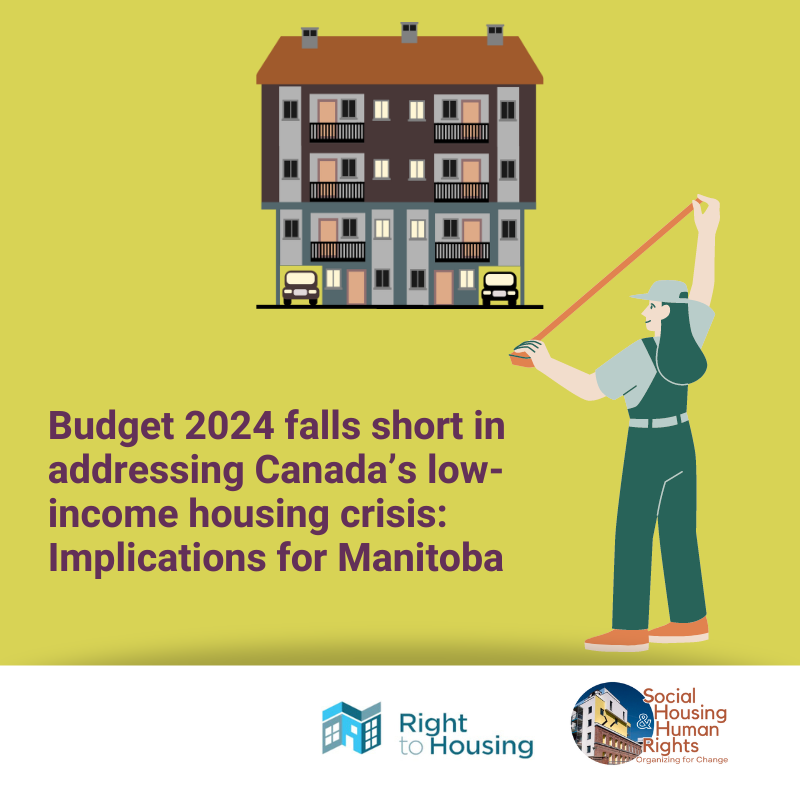
The Manitoba Right to Housing Coalition (RTH) and its national partner, Social Housing and Human Rights (SHHR) coalition is disappointed that Budget 2024 has failed to adequately invest in housing that is affordable to the lowest-income households and people experiencing homelessness. RTH has identified a need in Manitoba for a minimum of 10,000 new non-market social housing units with rents set at less than 30% of income over 10 years. SSHR has identified the need for at least 500,000 units across Canada over 10-years. The federal budget does not include a target for new social housing. Instead, it continues to focus on “affordable housing” for middle and high-income households.
Canada’s low-income housing crisis will not be solved without all levels of government collaborating to reinvest in social housing. Canada must take the lead in ensuring each level of government brings their respective fiscal and policy tools to the table to acquire, build, operate, and maintain new and existing public, non-profit, and cooperative-owned social housing. While Budget 2024 has made significant investments in housing, the federal government has failed to target that funding for social housing. However, the budget’s vague language of “affordability” opens a door for the provincial government to leverage funding to meet RTH’s social housing targets for Manitoba as outlined in the RTH Social Housing Action Plan for Manitoba and Thinking Inside the Box: How to Fund Social Housing in Manitoba.
Opportunities exist within the Affordable Housing Fund. RTH and SHHR are pleased to see an additional $1 billion for the development of non-market housing, and the commitment to create a stream within the fund to build “deeply affordable housing.” In Manitoba, this housing will not be affordable to low-income households or people experiencing homelessness without operating subsidies from the provincial government to ensure rents are set at less than 30% of household income.
The Rapid Housing Stream is the only place where Budget 2024 makes new investments in social housing, but the amount budgeted won’t meet the need and it is unclear exactly how many new units will be produced with rents that are geared to income. Based on results from previous rounds of Rapid Housing funding, Budget 2024’s investment is expected to generate less than 5,000 social housing units – a mere 10% of the annual need across Canada. Here too, Manitoba will need to step up with operating subsidies to leverage federal capital dollars to expand social housing locally.
The $1.5 billion Canada Rental Protection Fund aligns with the acquisition fund SHHR called for to support the non-profit sector to acquire and protect the existing affordable housing supply. It also aligns with RTH calls for a Manitoba acquisition fund similar to the B.C. Rental Protection Fund. However, social housing advocates emphasize that these funds should be set aside for non-market housing providers – public, non-profit and co-ops – exclusively. Here too, without operating subsidies from other levels of government, non-profits who use the fund will struggle to provide rents that are geared to income and ensure units are affordable to those in greatest need.
Finally, both RTH and SHHR have highlighted the need to use public lands and buildings to support the development of non-market social housing. While Budget 2024 announces plans to use public land and buildings to develop homes, the coalitions would like to see a commitment to prioritize land and buildings for non-market housing providers to develop social housing.
Apart from these modest steps in the right direction, Budget 2024 continues to rely primarily on failed policies that focus on incentivizing the private market to produce low-rent housing. We cannot keep doing the same thing and expect a different result. It’s clear we need
a new approach and the political will to lead it.
By Shauna MacKinnon and Kirsten Bernas, Right to Housing Coalition and Social Housing and Human Rights organization.


